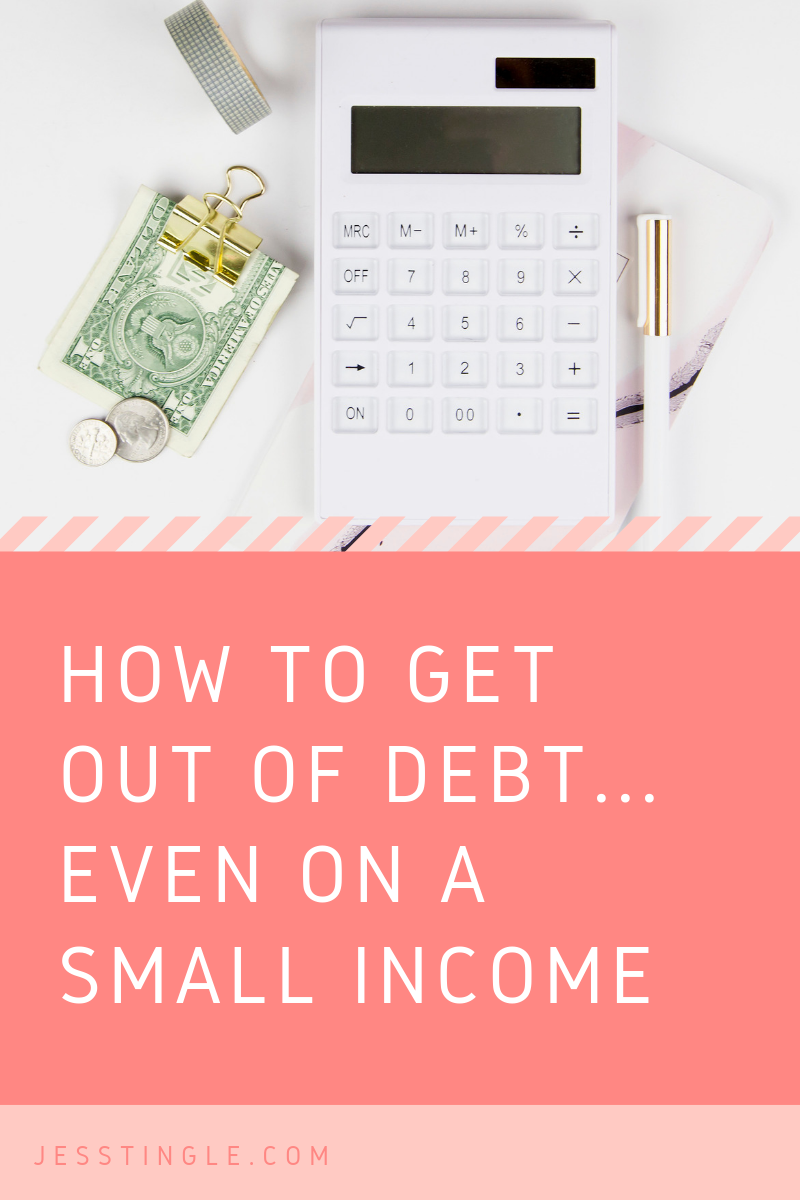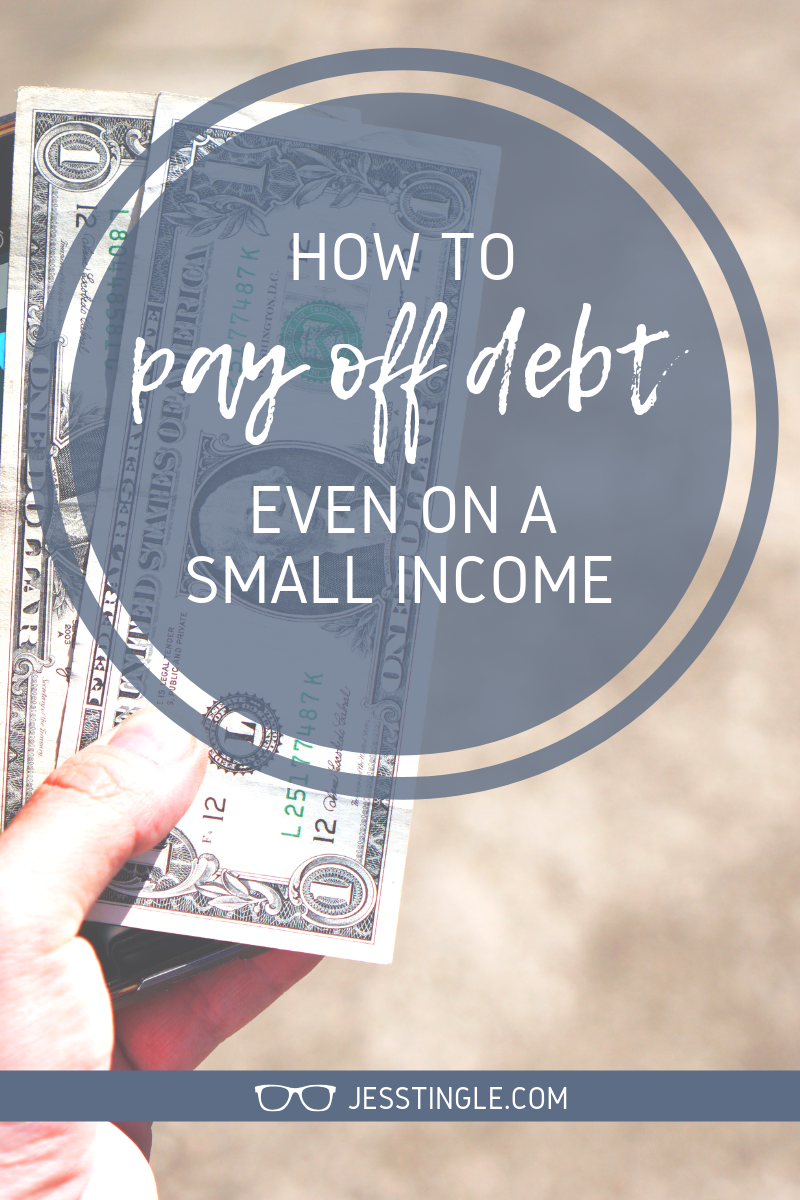How To Get Out of Debt Even on a Small Income
No matter how big your mountain of debt is, and regardless what you level of income is, you can get out of debt. Paying off debt is more about behavior than it is about math. The debt free journey is going to look different for every person or household, but I want you to have confidence in knowing anyone can pay off debt. You can do this.
I know when you’re staring at the amount of debt you need to pay off and the amount of income you have coming in for the month, it can look scary. I know you’re excited to live a life where you actually get to use the money you make in the way you want rather than paying for the past (that’s what debt is doing, by the way, forcing you to live in the past!). And I know you’re anxious to make progress with the debt pay off right away.
This is a good thing because it means you’re motivated to start living differently. You just need to make a plan and execute it. Remember that when you’re using the Debt Snowball Method (the best pay off method, in my honest opinion) you’re going to make slower progress in the beginning than you will at the end because each debt is going to build off the previous one’s payment.
So it might be slow at first, but that’s okay. The Debt Snowball is set up so you get the quickest wins first and stay motivated. That’s why this method starts off paying the debt with the smallest total balance first. Here’s the best advice to live by so you can start making as much progress as possible with any income and towards any amount of debt.
WRITE OUT YOUR TOTAL DEBT
I know this is scary, but to get started you need to figure out exactly how much debt you have. This includes everything except your primary mortgage (second mortgages and home equity loans should still be included in this debt total). For example this might include personal loans, car loans, furniture loans, student loans, credit card balances, etc.
Write your debts out in order of smallest to largest using the total balance due for each one (interest rates and minimum payments do not matter with the debt snowball method). Then total up all the balances. This will be the total amount of debt you’re going to conquer. I like having this number totaled and in a journal I use for finance notes because I can always refer back to it and see how far we’ve come.
Related: How to Get Out of Debt Fast
SHIFT YOUR MINDSET & WHAT INFLUENCES YOU
Paying off debt is more about your mindset and behavior changes than anything else. You’re completely changing the way you’ve been used to living, so of course it’s going to be hard. We’re only human so it’s normal to be tempted with “needs” and wants especially when we’re constantly being marketed to, even on (or, especially on) social media. You need to be careful of who you’re being influenced by so that you can keep your focus on debt pay off.
That cousin who always wants you to go shopping with her and convinces you to overspend on things you don’t need? Tell her you already have plans (a date with your paycheck on your debt free day!). Surround yourself with people who are going to be a positive influence towards debt payoff. You’re already reading this blog, so that’s a great start! Get involved with the #debtfreecommunity on Instagram and find people with similar situations to you. You can even join the Ramsey Baby Steps Community on Facebook. The point is to surround yourself with like minded people and positive influences.
Related: Stop Falling Into the Comparison Trap
CREATE A BUDGET & STICK TO IT
I’m not trying to sound like a broken record when it comes to “you need a budget, you need a budget” but you do! The budget is the foundation for all your personal finance moves. When you create (and stick to) a budget, you’re making a plan for where the money is going to go and prioritizing it in the way you want. That means you get to make debt a priority and make sure you’re putting as much money towards pay off as possible every month. The best way to budget is by using the Zero-Based Budget Method. With this method you’re taking every dollar of your monthly income and designated it a place to go whether that is saving, spending, or debt pay off. The Zero Based Budget allows you to use every dollar effectively and in the way that aligns with your priorities.
Related: How to Create a Budget in 7 Easy Steps
CUT EXPENSES
When you’re creating the budget, cut any unnecessary expenses (including monthly subscriptions that often go unused or aren’t necessary). You can choose to cut something like Netflix or cable and know that it’s only temporary. Cancelling those services doesn’t mean you’ll be without them forever, just until you’re in a better financial situation to afford them. We’re spending money according to priority, so the items at the lowest priority might need to be cut out.
You can make changes like meal planning or using frugal recipes to reduce food spending (and cut things like eating out at restaurants). And as much as I talk about the small things here, don’t forget about the big expenses too. Try moving to a different area where you can cut your rent expenses or shop around and see if you can get a lower insurance premium.
Related: The Art of Living Below Your Means
TAKE A NO SPEND CHALLENGE
A no spend challenge can be a fun way to stop yourself from spending money on unnecessary things. The challenge can last as long as you’re comfortable with, but I encourage you to push yourself outside of your comfort zone. Have a no spend weekend, a no spend week, or a no spend month. During the challenge you will freeze all spending with the exception of a few necessities like groceries, gas, doctor’s bills, etc. However, I personally like to push myself to do a grocery spending freeze and make as many meals as possible with what’s in the pantry before going back to the grocery store. The point of a spending challenge is to push yourself to be frugal and the use the money you would have spent to pay off debt.
SELL SOME STUFF
One of the best ways to add some extra cash to your debt pay off is by selling. Sell things you already own that you aren’t using anymore. Go through the house and find anything that doesn’t “spark joy” (thanks, Marie Kondo) and get rid of it. Clothes, movies, books, household items, furniture, anything you can get your hands on. Take items to consignment stores, sell them on Ebay, or Facebook. And beyond selling the stuff you already own, if you can make anything like vinyl tshirts, farmhouse tables, whatever it may be, then try selling those things to make some extra income as well.
Getting out of debt is going to take some hard work and sacrifice, but the result will be absolutely worth it. If you’re stressed out thinking it won’t work for you, my encouragement for you is to just take it one step at a time. One debt at a time. One budget at a time. One paycheck at a time. However small you need to break it down to make it manageable, just do that. If you can come up with an extra $100 a month to put toward debt you are going to see progress. Anyone can do this with some focus, dedication, and a support system!
If you’re ready to start paying off debt or you want further guidance in your pay off journey, get my completely FREE downloadable Debt Free Guide. This is a full guide of reading and prompts that gives you the steps to paying off debt in a bite sized format so that you can stop feeling overwhelmed and start feeling motivated!

